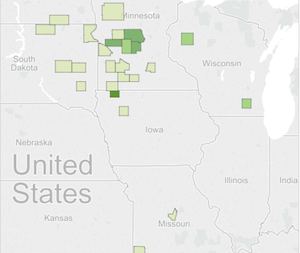The number of commercial birds to fall prey to avian influenza nearly tripled Monday when a single facility containing millions of hens was diagnosed with the disease.
In a news release, the U.S. Department of Agriculture said an Osceola County, Iowa, egg-laying facility containing up to 5.3 million hens had caught the virus. Any birds not killed by the disease will be put down, likely by carbon dioxide gas, officials said.
During a Tuesday conference call, Iowa agriculture officials said the size of the operation wasn't unusual -- most of the state's 60 million hens are concentrated in similar facilities -- but it would complicate efforts to euthanize and dispose of the birds.
The infection raised fears in Iowa, which produces more eggs than any other state. At full capacity, the infected facility holds about 8 percent of Iowa's hens.
Randy Olson, executive director of the Iowa Poultry Association, said pricing is unlikely to change despite the size of the facility.
"This is a large and complex egg market," he said. "We're certainly not the only state that produces eggs."
The Iowa infection occurred as the spread of the virus continues to accelerate. Among commercial birds, the USDA has identified 35 flock cases of avian flu in April, compared to six in March, one in February and one in January.
Prior to Monday, about 2.7 million commercial birds had caught the disease, according to the USDA. The infection at the Iowa facility brings the total to 7.9 million.
Though more birds have been killed in Iowa, far more facilities have been hit in Minnesota -- 25 so far this month.
Minnesota-based Hormel Foods, which owns the Jennie-O Turkey brand, said Monday that the disease had hit multiple farms that supply its factories and would result in lower turkey supply.
Erica Gunderson, spokesman for the Minnesota Board of Animal Health, said 109 federal employees were working in the state on the avian flu outbreak "and we are getting more everyday." She said the state had requested an additional 100 workers.
"We definitely have a lot of people there and we definitely we have a lot of need," she said.
The number of infections is starting to strain federal resources. On Monday, Wisconsin Gov. Scott Walker authorized the National Guard to assist authorities in responding to the disease. Two commercial farms have been affected in his state.
In a news release, Walker's office said that the assistance is necessary because federal resources are thin.
"We must act quickly and efficiently to contain the outbreak and protect domestic poultry," Walker said in a news release.
John Clifford, chief veterinary officer for the USDA, said the agency has been able to handle the workload so far, though there have been some delays in euthanizing birds.
The agency has started to call retired employees and others to help.
"We certainly have been stressed with regards to this. There's not one focus point," he said. "We've been able to handle it this far."
In Arkansas, a turkey farm in Boone County caught the disease in March. About 40,000 birds were killed by the disease or euthanized.
After checking and double-checking commercial and backyard poultry within about six miles of the site, the area was given the all clear in early April, said Bruce Holland, director of the Arkansas Livestock and Poultry Commission.
"We were very fortunate," he said. "But I think this fall we need to be on high alert when those birds start coming back this direction."
Researchers believe that the virus is carried by wild birds, which sickens but does not kill them. During the fall, those birds will fly south and could carry the disease back to Arkansas, Holland said.
"We've come to a new stage in the poultry industry where we're going to have to increase biosecurity year-round," he said. "It's something that we obviously should be worried about. I know it's got a lot of growers' attention."
Business on 04/22/2015
